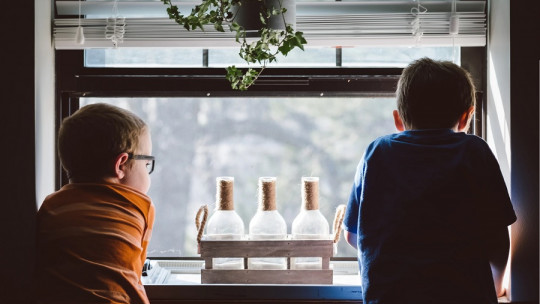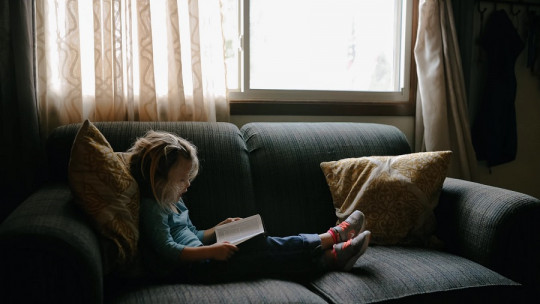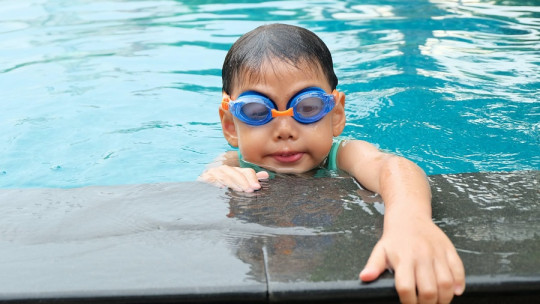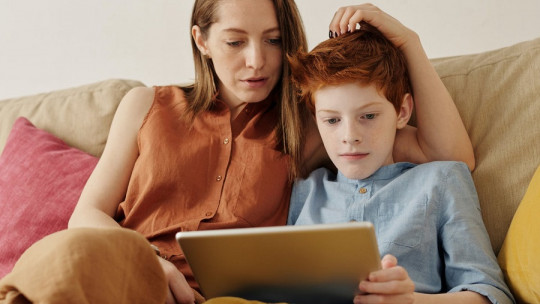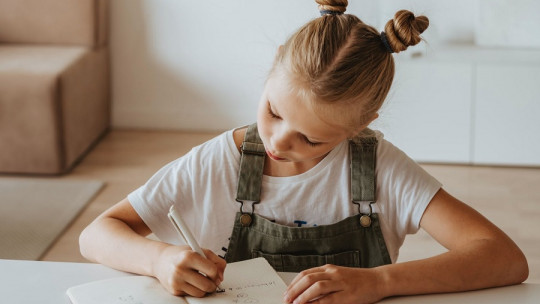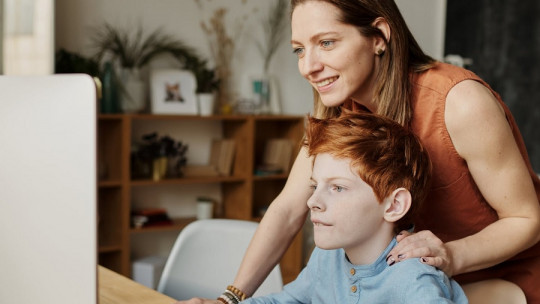
Living in confinement is a hard, very hard moment. Not being able to go out even for a walk is a stressful and unpleasant situation for both adults and children, especially for those with ADHD.
Boys and girls with this disorder cannot stand still, needing to expend their energy (if they ever run out) throughout the day. If they cannot go running or play in the park, it is clear that their families are going to have to face a complicated situation in addition to how difficult a confinement already is.
This is why it is so important to give guidelines for parents on how to help a child with ADHD get through confinement in anticipation that we will have to live again like the one that began in the month of March.
Tips to help a child with ADHD get through the months of confinement
The first lockdown was highly disruptive. Nobody expected it and nobody knew how to handle it. It was a real headache for parents and teachers, having problems with the care and education of children at home, who saw how their routines and activities changed due to COVID-19. This was even more serious in the case of children with ADHD, who are so in need of additional structure and support to manage the attention and behavioral challenges typical of their disorder.
The March confinement disrupted the daily lives of all the children who saw their school schedule disappear, being replaced in the best way possible by virtual classes. The routine established after half an academic year suddenly ended. The problem is that children, and especially those who have attention and hyperactivity problems, need routine.
Whether it’s fun or boring, they need something that gives structure to their time, that lets them know what’s coming next If this is not the case, there will be uncertainty and that is especially disruptive in the learning and development of any child.
But the problem was not only the closure of classes, but also not being able to go outside. Children need to play, spend their energy running and having fun with others. Not being able to go out, being locked up at home for weeks, was an especially bad situation for children with ADHD. As it was a totally new situation at that time, there were no manuals on what to do in such a situation, which translated into poor sleeping habits, abuse of new technologies and various behavioral problems.
Fortunately, we have learned from the first lockdown. We do not know exactly if there will be a new confinement, although unfortunately the situation does not look good. The first confinement caught parents, psychologists, educational psychologists, teachers and, of course, children with ADHD off guard. Fortunately, after the experience of the first confinement we have learned what to do to help a child with ADHD pass the confinement of the best possible way and prevent this overwhelming situation from profoundly altering your behavior and emotional regulation
How to overcome confinement with children with ADHD
The best strategy for parents of children with ADHD is to anticipate the probable situation of confinement. During the first confinement everything came suddenly: between the classes for the little ones in the house being canceled and the parents not knowing how they were going to telework, everyone was confused. Fortunately, now that we have had that first experience, we know what we can do to overcome this situation with our children with ADHD.
It is essential to design a weekly action plan that is reviewable, agreed upon and modifiable This plan will be a schedule that will organize the time of the child with ADHD, something that, as we have mentioned, is essential for these children with regulation problems. The activities that should be in this plan should be focused on what the child can learn at home, with some that arouse her interest and serve to keep her busy in case she cannot leave the house.
Now, how and what points should this action plan have? The lives of children with ADHD can be very “chaotic”, so having good order and organization is the best ally to combat the problems associated with this disorder, problems that will emerge in full force due to confinement. When planning the week for children with ADHD, the following should be taken into consideration:
1. Create a routine
Boys and girls with ADHD have difficulties with self-regulation, motivation and activation. They are children who They become frustrated, explode, and get upset more easily, especially in ambiguous, repetitive, monotonous, and unstimulating situations This is why it is so essential to create a clear, thought-out and long-term routine. The routine will give you a feeling of tranquility and a certain control and, as a consequence, family functioning during this confinement will be somewhat less difficult.
It’s okay to keep them interested with new activities, but the body of this plan, that is, the main structure, must contain activities that are always the same on the same days at the same time. The plan must be made in the image and likeness of the schedules to which the child was accustomed in class, which is why it is very important to take into account what subjects he/she did each week.
2. Post the schedule in writing
It is very important to leave the written plan somewhere clearly visible in the house, preferably the refrigerator door or a place where the child will spend a lot of time during confinement (desk, living room or bedroom). The schedule should have visual elements that easily indicate what the child has to do (e.g. doing math homework = drawing a calculator), marking the subjects or types of assignments in different colors.
If the school has not organized a specific schedule of virtual classes, it is especially recommended that the child do his homework after breakfast, just at a time when he is already awake and is not yet too tired to concentrate. Everything that is leisure can be done in the afternoon, which is the recommended time for it. You can tell him that if he manages to do his homework in the morning he will have the entire afternoon free for whatever he wants to do.
3. Agree on planning
It is very important that children participate in the planning. The idea is not that they do everything they want, but neither that only boring activities are imposed on them, which they are going to leave halfway and change them for all kinds of distractions that they themselves will look for.
For this reason we should talk to them about what they would like to do to, to the extent possible, turn it into educational and recreational activities, something that serves to entertain you but at the same time learn.
4. Take care of personal habits
But in addition to taking school activities into account, personal habits must also be established and maintained. Many children associate the idea of being at home with a holiday, something that should not happen in confinement because it can seriously alter their sleep, hygiene and, of course, study patterns. In fact, this is not only something that has happened to young children, with or without ADHD, but also to adults.
For this reason, it is essential to clearly mark on the schedule what time they should wake up, when they should go to sleep, indicate the days they should shower or bathe, when to brush their teeth, when to get dressed (they should not wear their pajamas all day). at home), at what time they can watch TV, for how long… and any other behavior that occurs to us. They must understand that no matter how much they are at home, they are still there on a weekday and, therefore, they must be studying
As parents we must ensure that this is fulfilled. If the child does not wake up on his own, we will have to wake him up even if he feels bad to us. Also, we must respect the hours of breakfast, lunch, snack and dinner and, if possible, set a meal schedule imitating the same one that school cafeterias follow. The idea is that the child’s life is as organized as possible, despite the uncertainty of not knowing when he will be able to go out again to see his classmates or play in the park.
5. Involve the child in household chores
In addition to organizing educational tasks and personal habits, we can take advantage of confinement to have the child help us with household chores, this being a fantastic way to make him channel his hyperactive energy into something that he will have to learn sooner or later to be able to do. be a functional adult. Tasks can be agreed upon in which parents and children help each other, such as sweeping, making the beds, cleaning the dishes.
Involving the child in household chores will make them learn things that will be useful for the future and that, as a general rule, are not taught in school, much less in a virtual class. In addition, it will serve for parents and children to share a moment together, not necessarily playful, but meaningful since the boys and girls will see that they can be useful and help their parents in taking care of the home.
6. Reward the child appropriately
In general, children with ADHD need short-term gratification For this reason, tasks should be organized in such a way that, after doing a less pleasant one, do one that interests you in order to keep your attention. For example, if you don’t like doing homework or studying mathematics but you do like reading, we can organize your morning by first putting the activity “doing homework” followed by “reading” and then “doing math.” The idea is to intersperse the activities so that the gratification is not continuous but is not too delayed either.
Nevertheless, The “jackpot” must arrive in the afternoon The playful time of the day should come at a time when the child is too tired to continue studying, usually after 5 p.m. It is that time when he can play video games, do sports at home, listen to music, do crafts or watch TV. It is also very important to specify which leisure activities you can do alone and which you can do with your parents.
Although electronic devices are a prize like any other, it is very important to limit their use, and even more so taking into account that since children will not be able to leave the house or have direct contact with their friends, they will most likely lose their notion of time using these devices. If we let them use them, we should watch them while or, at least, set up a parental control program and program the device to turn off after a while.
7. Communicate with the school
It’s very important Stay in touch with the school to know what to do It is important to know what support our child receives in class and how the continuity of what they learn at home could be maintained. We should ask teachers what we should do to keep our child organized, focused, and on task. The following questions cannot be omitted:
8. Organize sessions with other parents
With the experience of the first confinement, many parents learned the importance of staying connected and organized so that your sons and daughters could see each other at least through a screen If it had not been for these sessions, many children would not have seen their classmates for more than 6 months, taking into account that the de-escalation began just when the academic year ends.
However, many times these sessions were anarchic, in the sense that they were remembered from one day to the next. The ideal is for parents to organize at least one weekly session for children to share what has happened to them during the week, what homework they have done, what they would like to do when they can get together again or play a game online. line.
These sessions can be especially nourishing for parents, too, especially within a group with children with ADHD. Surely one of the parents has discovered some activity or strategy that allows them to emotionally regulate their child in such difficult times and that they will have no problem sharing with others. You can also create a separate group in which you discuss how you are going to set it up to coordinate the children’s learning while at home.
Naturally, in addition to the parents, the boys’ and girls’ teachers should also be consulted. The teacher is not simply the adult who goes to class and explains what they have to learn, but a man or woman who is as much of a reference as a parent can be. For this reason, we must keep them informed and also ask them for information and, as a virtual recreation, organize a game session also including them.
9. Use positive attention
Positive attention is the most powerful motivator you have to influence children’s behavior, and it is especially so with children with ADHD. Children with attention and impulse control difficulties benefit greatly from receiving large, encouraging, intense praise When we talk about positive attention we should not think in terms of whether our comments are negative or positive, but rather in how long and in what way we pay attention to them and the quality of it.
Telling the child a brief and concise “Good job” is not the same as saying “Wow! “Very good for starting your homework so soon!” The second comment is more personal, better thought out and has a much more motivating component. The boy or girl tries harder if she sees that adults value her efforts. The child must see that what she does is valued, not that she is allowed to do her homework to keep her away from adults and prevent her from bothering them while they are teleworking.
10. Tell you when the adults are free
Finally, we are going to talk about something that has more to do with adults than with children: teleworking. In a confinement it is not only the classes for the little ones that are no longer in person but the way of working also changes. During the first confinement this was especially chaotic for those workers who had never done such a thing in their entire lives as working from home, having to do housework and take care of children at the same time, that is, juggling life. .
For this reason it is very important make children understand that there will be times when they will have to do their homework or entertain themselves The problem is that adults do not always have set schedules, so we cannot tell the child that we are going to be free at a specific time of day because we ourselves do not know if it will be true or not. For this reason, as an alternative, we can use a traffic light code to tell the boy or girl if dad or mom is free.
This method is not very complicated. It simply consists of putting a green (free) or red (occupied) piece of cardboard on the office door or wherever the child can see it and know if the adult is free or not. If both parents work, they can both use the same method using their own traffic lights. This way, parents can take turns playing or watching the child.
It is also very important that if we have promised to spend some time with our child with ADHD, although it is also applicable to one without the disorder, we are not distracted. If you have asked us to help you with your homework or want to play Parcheesi, we must leave your work email closed or your cell phone out of our sight. The idea is to spend some time with our son, disconnect from work now that we can and take advantage of this father/mother-son moment, which is one of the few good things that confinement gives us.
Conclusions
Caring for children with ADHD is not easy in normal situations due to their emotional regulation problems, self-control and impulsiveness, something that is even more complicated in times of confinement. In the hypothetical case that we are locked up in our homes again, it is expected that children will be very nervous about not being able to go out to play and spend all the hyperactive energy that their little bodies are capable of producing. The first confinement caught us by surprise, the second not anymore.
Routine is essential to help a child with ADHD get through confinement in the least overwhelming way possible Knowing when you have to do your homework, alternating enjoyable activities with those you like less, is a perfect way to keep your child busy and continue learning at a time when the main place of learning, school, is closed. Personal habits, sleeping patterns, hygiene should also be monitored and taught how to help at home.
Finally, it is essential to keep him in contact with his friends, since, as happened with the first one, we do not know how long a new confinement could last. It could be weeks, it could be months, it could be half a year. Whatever the time, it is essential that boys and girls know how their classmates are doing, see their faces through video calling applications and can talk about the same topics they talked about during playground time, only now virtually. .

